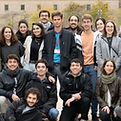The EU Future is Climate

We’re building a community of 27 young Europeans (age 18 to 35) ready to discuss, defend and make recommendations regarding Europe’s climate present and future. Will you join us?

What is the EU FUTURE IS CLIMATE?
The EU Future is Climate is a groundbreaking initiative designed to empower young people across the EU to co-create climate policy. Based on the Spanish experience, this project brings together a European Climate Metaforum with young representatives from all over the EU.
Together, they engage in training, dialogue, and consensus-building, culminating in actionable policy recommendations.
In a world constantly inundated with misinformation, polarization, hate speech, and clickbait videos, we need more spaces for calm and nuanced debates. It’s what the complexity of the climate crisis needs. Climate action requires everyone to step up, and who better than young people to do so?
The EU Future is Climate is not just about speaking up; it’s about developing critical thinking on a topic, it’s about listening and contributing actively to debates, and it’s about building shared solutions in an increasingly polarized environment. What would the topic be?
What can you expect
Creation of a deliberative body: the EU Climate Metaforum.
Online training sessions with leading climate and democracy experts so that every participant has a similar baseline knowledge
Online dialogue sessions with moderators to help drive the informed and thorough conversations
Final consensus-building sessions in Brussels.
Advocacy to ensure policy recommendations are heard by EU authorities
Communication to make this a genuinely public debate, it is crucial to open up the dialogue to as many people as possible.
Do you want to be part of The EU Future is Climate?

EU Climate Metaforum
27 young representatives from all over Europe that will discuss, defend and make recommendations regarding Europe’s climate present and future.
Are you a young EU citizen (18-35)? Do you want to be part of the EU Climate Metaforum?
%20(1)%20(1).jpg)
EU Climate Advisory Council
Climate and democracy experts that want to join the Climate Metaforum in the deliberation and consensus-building sessions, providing their knowledge and guidance.
Do you want to join this deliberative body, or do you want to recommend someone you know?
Send us an email: info@demoslab.com
_HEIC.png)
EFIC Collaborators
They are the amplifiers, the ecosystem that helps us reach people. Let’s make sure that more and more people engage in this participatory process!
Are you a media outlet? An academic institution? A climate or youth network? Would you like to share this project or discuss it with your audience or stakeholders?
Send us an email: info@demoslab.com
Mark your calendars!
-
Closure of the draw: 7 November
-
Announcement of participants: 17 November
-
Welcome session: 24 November
-
Training sessions: 2h per week December to mid January
-
Deliberation sessions: 2h per week mid January and February
-
Final consensus-building session: 3-day trip to Brussels in March

.png)
.png)
